Alfred Scott (British politician)
Alfred Henry Scott (24 June 1868 – 17 July 1939) was a British Liberal politician.
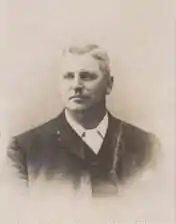
Background
Scott was born in Ardwick, Manchester, the eldest son of Charles Henry Scott JP. He was educated at Altrincham Grammar School; Tideswell Grammar School and Lichfield Grammar School. In 1907 he married Katherine Duncan, the widow of Mr Lewis of Kentucky.[1]
He entered business as a merchant in the city.[2] He was elected to Manchester City Council in 1897. At the 1900 general election he was the Liberal candidate at Manchester East, where he stood against the Conservative First Lord of the Treasury, Arthur Balfour. In his election address he set out his political views: he supported reform of the Army, Home Rule for Ireland, the temperance movement, abolition of the House of Lords, and nationalisation or municipalisation of land, railways and mines.[2]
| Party | Candidate | Votes | % | ±% | |
|---|---|---|---|---|---|
| Conservative | Arthur Balfour | 5,803 | 63.4 | ||
| Liberal | Alfred Scott | 3,350 | 36.6 | ||
| Majority | 2,453 | 26.8 | |||
| Turnout | 71.9 | ||||
| Conservative hold | Swing | ||||
At the next general election in 1906 he stood at Ashton under Lyne, and was elected as the town's Member of Parliament.[4]
| Party | Candidate | Votes | % | ±% | |
|---|---|---|---|---|---|
| Liberal | Alfred Scott | 4,310 | 56.3 | +20.4 | |
| Conservative | Herbert Whiteley | 3,342 | 43.7 | -9.4 | |
| Majority | 968 | 12.6 | |||
| Turnout | 7,652 | 92.8 | +6.6 | ||
| Liberal gain from Conservative | Swing | +14.8 | |||
Following his election to parliament, he stood down from Manchester City Council, after 9 years service. In 1907 he became Vice-President of the Association of Municipal Corporations. Whilst an MP he voted in favour of the 1908 Women's Enfranchisement Bill.[5] He held the seat at the January 1910 election.
| Party | Candidate | Votes | % | ±% | |
|---|---|---|---|---|---|
| Liberal | Alfred Scott | 4,039 | 49.3 | -7.0 | |
| Conservative | Herbert Whiteley | 3,746 | 45.9 | +2.2 | |
| Independent Labour | William Gee | 413 | 5.0 | ||
| Majority | 293 | 3.6 | -9.0 | ||
| Turnout | 8,198 | 95.4 | +2.6 | ||
| Liberal hold | Swing | -4.6 | |||
A second general election was held in December of the same year. Scott was defeated by the Canadian millionaire Max Aitken (later Lord Beaverbrook), who had been "parachuted" in as the Liberal Unionist candidate.[6]
| Party | Candidate | Votes | % | ±% | |
|---|---|---|---|---|---|
| Conservative | Max Aitken | 4,044 | 51.1 | +5.5 | |
| Liberal | Alfred Scott | 3,848 | 48.8 | -0.5 | |
| Majority | 196 | 2.4 | |||
| Turnout | 7,652 | 91.8 | -3.6 | ||
| Conservative gain from Liberal | Swing | +3.0 | |||
Scott moved to London. In 1913 he contested the 1913 London County Council election as a Progressive Party candidate at Greenwich but was defeated.[7]
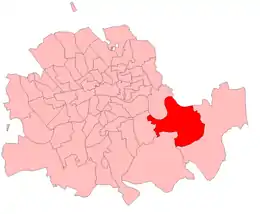
| Party | Candidate | Votes | % | ±% | |
|---|---|---|---|---|---|
| Municipal Reform | 4,815 | ||||
| Municipal Reform | 4,787 | ||||
| Progressive | Alfred Scott | 4,486 | |||
| Progressive | Hugh Moulton | 4,463 | |||
| Majority | 301 | ||||
| Municipal Reform hold | Swing | ||||
| Municipal Reform hold | Swing | ||||
Despite this defeat he was immediately appointed to be a Progressive Party alderman on the London County Council.[8] The Progressives were the municipal wing of the Liberal Party in London. He remained a member of the LCC until 1919. Scott attempted to return to the Commons, and was the unsuccessful Liberal candidate at Darlington in 1918, where the Unionist candidate was endorsed by the Coalition Government;
| Party | Candidate | Votes | % | ±% | |
|---|---|---|---|---|---|
| Unionist | Herbert Pease | 11,951 | 61.5 | ||
| Liberal | Alfred Scott | 7,494 | 38.5 | ||
| Majority | 4,457 | 23.0 | |||
| Turnout | 67.8 | ||||
| Unionist hold | Swing | ||||
In 1922 he stood for election to the London County Council and was defeated by a Municipal Reform Party opponent in the St Pancras South East Division.[10]
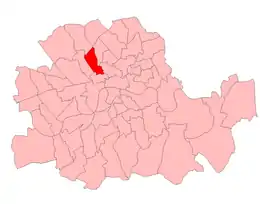
| Party | Candidate | Votes | % | ±% | |
|---|---|---|---|---|---|
| Municipal Reform | 5,158 | 26.8 | |||
| Municipal Reform | 5,114 | 26.6 | |||
| Labour | S Presbury | 2,617 | 13.6 | ||
| Labour | HD Large | 2,613 | 13.6 | ||
| Progressive | Arthur Lewis Leon | 1,859 | 9.7 | ||
| Progressive | Alfred Scott | 1,856 | 9.7 | ||
| Majority | 2,497 | 13.0 | |||
| Municipal Reform hold | Swing | ||||
| Municipal Reform hold | Swing | ||||
Later that year he again stood as a candidate at the General Election; West Ham Stratford in 1922
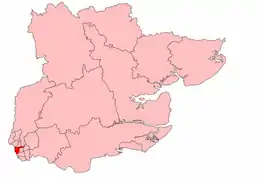
| Party | Candidate | Votes | % | ±% | |
|---|---|---|---|---|---|
| Labour | Thomas Groves | 10,017 | 46.8 | n/a | |
| Unionist | Leonard Lyle | 8,641 | 40.5 | -23.3 | |
| Liberal | Alfred Scott | 12.7 | -23.5 | ||
| Majority | 1,376 | 6.3 | 33.9 | ||
| Turnout | 64.9 | +22.6 | |||
| Labour gain from Unionist | Swing | n/a | |||
and the following year he stood for parliament at Finsbury in 1923.[13]
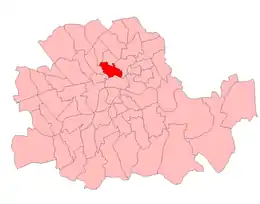
| Party | Candidate | Votes | % | ±% | |
|---|---|---|---|---|---|
| Labour | George Gillett | 8,907 | 42.4 | +19.1 | |
| Unionist | Martin Archer-Shee | 7,063 | 33.6 | -11.0 | |
| Liberal | Alfred Scott | 5,054 | 24.0 | -6.4 | |
| Majority | 1,844 | 8.8 | 30.1 | ||
| Turnout | 21,024 | 53.8 | -0.5 | ||
| Labour gain from Unionist | Swing | +15.0 | |||
He retired to Birchington, Margate where he was appointed as an Alderman and served as a Justice of the Peace. He died in Thanet, Kent aged 71.
External links
- Hansard 1803–2005: contributions in Parliament by Alfred Henry Scott
| Parliament of the United Kingdom | ||
|---|---|---|
| Preceded by Herbert Huntington-Whiteley |
Member of Parliament for Ashton-under-Lyne 1906 – Dec. 1910 |
Succeeded by Max Aitken |
References
- 'SCOTT, Alfred Henry', Who Was Who, A & C Black, an imprint of Bloomsbury Publishing plc, 1920–2007; online edn, Oxford University Press, Dec 2007 accessed 19 Dec 2013
- "The Position in the Constituencies", The Times, 18 September 1900, p.4
- British parliamentary election results, 1885-1918 by Craig
- "Progress of the General Election" The Times, 13 January 1906
- http://hansard.millbanksystems.com/commons/1908/feb/28/womens-enfranchisement-bill-1
- "Discover Tameside's Heritage". The Tameside Citizen. Tameside Council. 10 October 2006. Archived from the original on 4 September 2009. Retrieved 27 October 2008.
- The New Hazell Annual and Almanack, 1914
- "London County Council, First Meeting of the New Body", The Times, 14 March 1913, p.5
- British Parliamentary Election Results 1918-1949, FWS Craig
- "L.C.C. Elections, Municipal Reform Gains, Labour Stationary", The Times, 3 March 1922, p.12
- London Municipal Notes - Volumes 18-23, London Municipal Society
- British Parliamentary Election Results 1918-1949, F W S Craig
- The Times, 26 November 1918, p.7; 27 October 1922, p.8; 27 November 1923, p.8